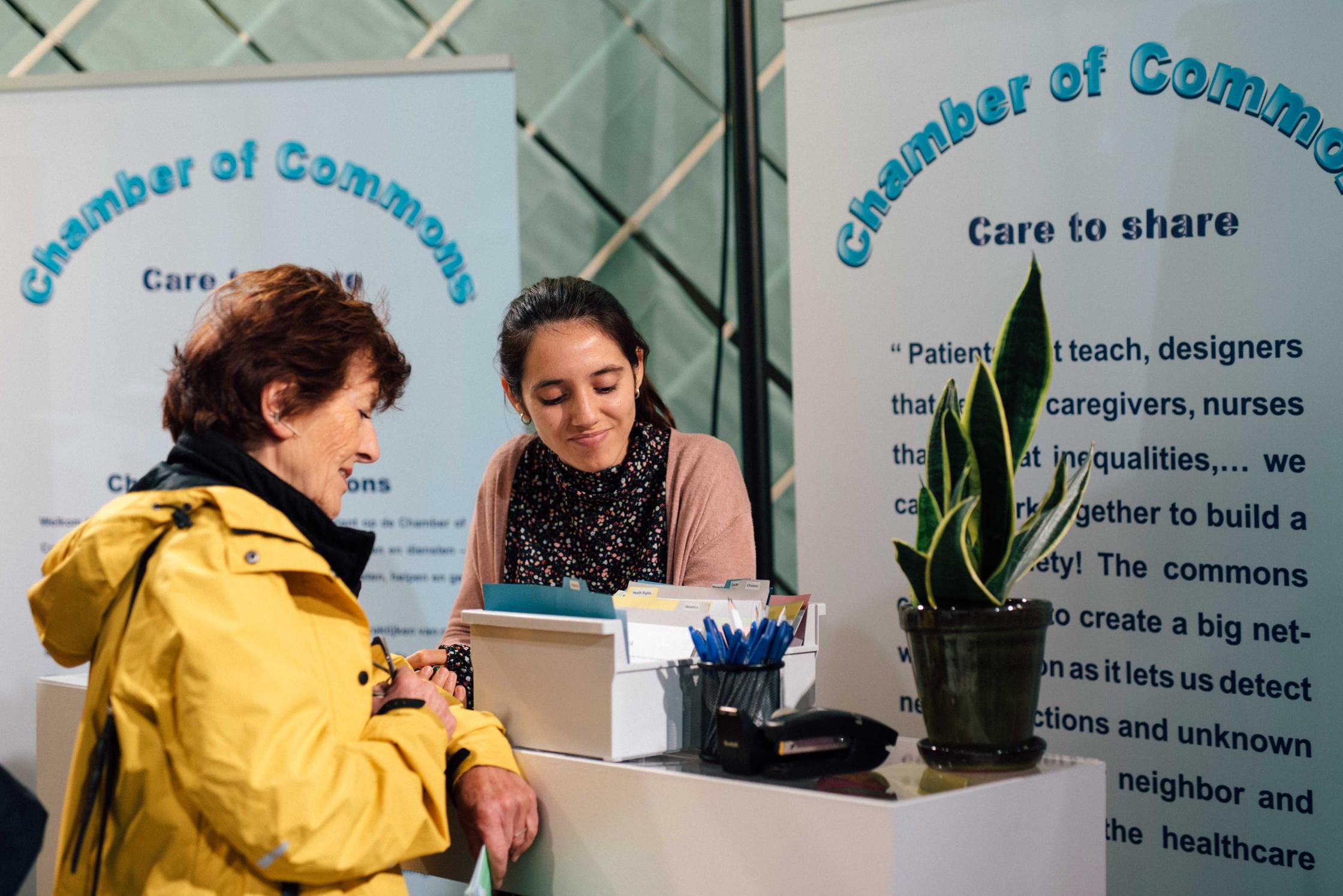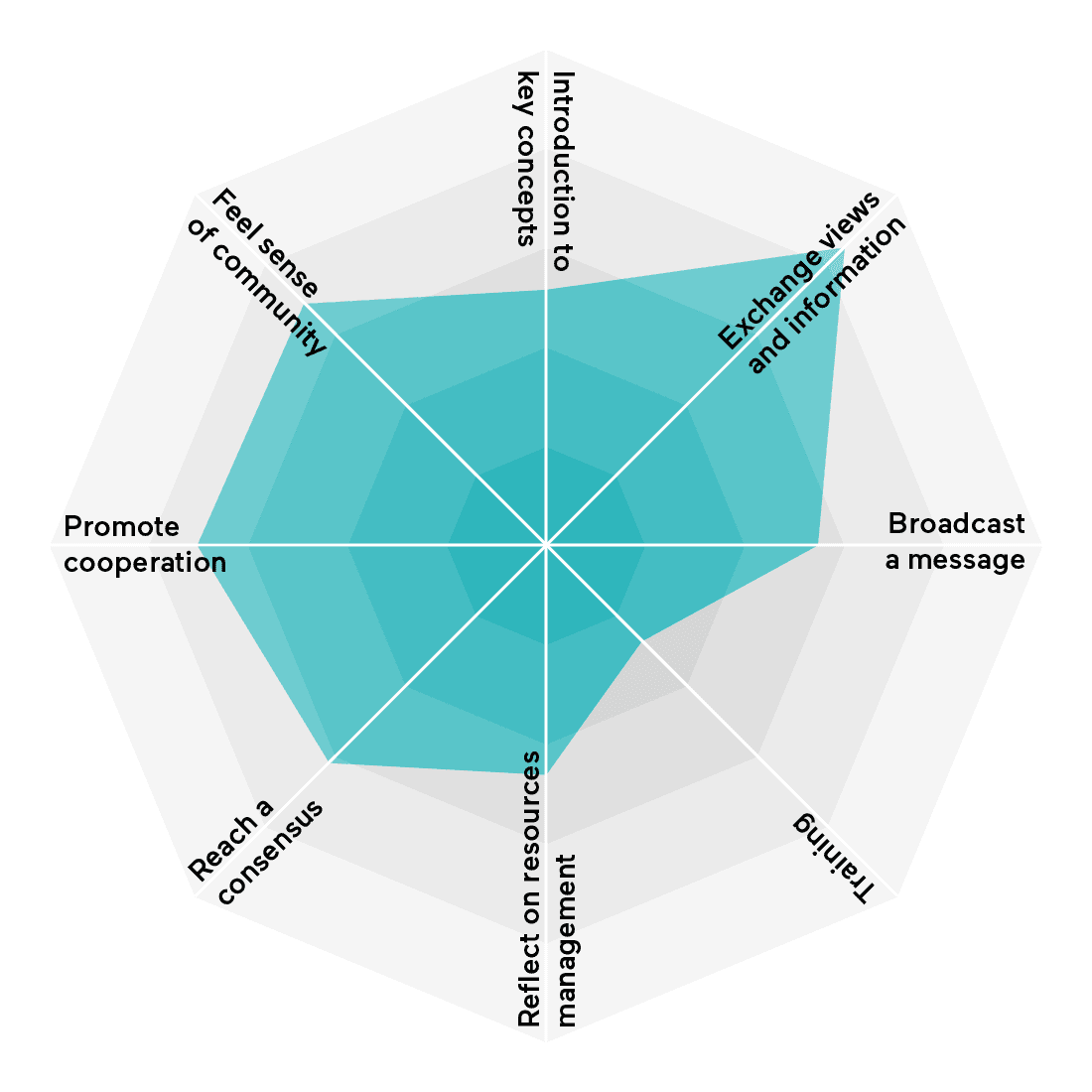The Chamber of Commons made its first appearance at the Embassy of Health of the Dutch Design Week 2019. We explored new forms of cooperation to tackle healthcare challenges and had many passionate conversations.
Redefining healthcare as commons
“Je wordt gebeten door de hond, of gekrabt door de kat” (You can get bitten by the dog or scratched by the cat). Is not vulnerability what make us human? And it is not mutual care that makes us live? Around the world, people are working on the creation of ‘caring cities’: cities that recognize that caring has a central role in our daily life and in which citizen’s wellbeing is a collective responsibility. You could say that this collective action has a commons approach. Commons are shared resources self-managed by the community themselves and can be a component to build caring cities. Initiatives like Soprasotto (Milan, Italy), Wheelmap (Berlin, Germany) or “Vic, caring city” (Vic, Spain) are some examples.
Vulnerability make us human, but is not distributed equally. Luckily, commons can also contribute to combat the worst health epidemic: inequality in health. Due to the fact that commons force social relations through collaboration in a context that lets people decide collectively the rules for managing the resources on which they depend. New forms of cooperation to tackle healthcare challenges in more equitable and ecologically responsible ways were shown at the Dutch Design Week 2019.
Caring humans and human care at the Dutch Design Week
Designers, healthcare professionals, teachers, artists, students, architects,… 360.000 visitors explored every imaginable discipline of design at the Dutch Design Week 2019. At the exhibition “Chronic Health: It’s only human?” of the Embassy of Health (a partnership between six Dutch organizations: Waag, Philips Design, Creative Industries Fund NL, Maxima MC, U CREATE and Dutch Design Foundation), around 70.000 assistants reflected on the dilemmas of healthcare and delved into the human-focused healthcare transition that is already happening. With a collection that lied at the intersection of science, art, technology and design the Embassy of Health invited everybody to share their thoughts on health and wellbeing challenges.
One of the questions that the exhibition raised up was how we can create an accessible network of informal care at neighborhood level. In this context, the Chamber of Commons invited participants to reflect on their role in this caring ecosystem.
The Chamber of Commons
On the face of it, the Chamber of Commons features nothing but boring office stuff. Cluttered papers, pens that constantly get lost, a desk with a stamp. Even the office plant appeared like it was cut from a nostalgic Belgian movie picture. However, getting closer to the Chamber, we discover that it is much unlike a conventional office.
Inspiring healthcare initiatives based on common values are put on display, colorful banners that redefine healthcare as commons decorate the scene, and helpful clerks guide visitors to find their place themselves in this caring ecosystem. Moreover, visitors can reflect on how they can transform their projects into common-based initiatives and share their own experiences.
By filling a commoner profile registration form, many visitors “entered” to the Chamber of Commons. In contrast to chamber of commerce registration forms, company details or business activities were not asked but the relevant skills to care the others.
The Chamber of Commons is an initiative of the Waag Commons Lab in collaboration with the Commons Network, De Meent and the Sustainable Finance Lab. In the Dutch Design Week 2019 it has taken the shape of an office but it is a bigger project that brings to light the diversity of commons ideas and practices. Its mission is to raise public awareness on the commons, tickle the senses, and demonstrate new models through which the commons can address societal questions.
A utopia or a real need?
Are caring cities a naïve idea? Is it possible to actively participate in a caring city while working 8 hours per day? There are many challenges that visitors highlighted in the Chamber of Commons. Two demographics that were particularly engaged stood out. First off, we talked a lot with people near to retirement age who work or have worked in the care sector. Without exception they displayed great dismay with the functioning of today’s care system. On the other hand, we talked to many young people, often designers. They were each deeply convinced that their design work should focus on a caring society and were much drawn to the commons perspective. Indeed, more and more healthcare is being redefined as commons, in many places within different contexts, giving participating members a significant degree of sovereignty and control over important elements of their everyday lives.
We met many Dutch initiatives that are already working for community’s well-being during the Dutch Design Week 2019 such as Natuur Wandelen, BeMyEyes, Zorgvrijstaat or the Care Lab. During the inspiring talks we had with the Chamber of Commons visitors, many aspects for successful commons raised up. The same ones that many years ago already confirmed Elinor Ostrom while designing the principles for commons: modes of participation, deliberation, transparency, responsibility, and effectiveness. These are the key elements that are shaping this healthcare transition.
Are you carrying out a healthcare project with a commons approach? Are you already building caring cities? You are welcome to submit your project at the Chamber of Commons! If you are interested in explore healthcare projects that promote cooperation, co-responsibility and participation in the decision-making process you can have a look at some inspiring cases.


